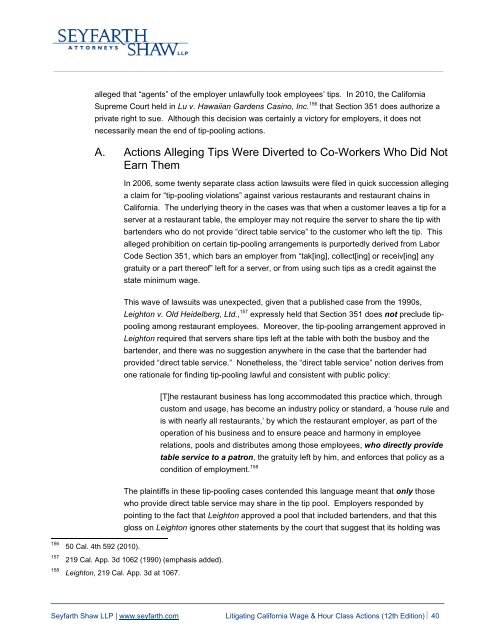Litigating California Wage & Hour and Labor Code Class Actions
Litigating California Wage & Hour and Labor Code Class Actions
Litigating California Wage & Hour and Labor Code Class Actions
Create successful ePaper yourself
Turn your PDF publications into a flip-book with our unique Google optimized e-Paper software.
alleged that “agents” of the employer unlawfully took employees’ tips. In 2010, the <strong>California</strong><br />
Supreme Court held in Lu v. Hawaiian Gardens Casino, Inc. 156 that Section 351 does authorize a<br />
private right to sue. Although this decision was certainly a victory for employers, it does not<br />
necessarily mean the end of tip-pooling actions.<br />
A. <strong>Actions</strong> Alleging Tips Were Diverted to Co-Workers Who Did Not<br />
Earn Them<br />
In 2006, some twenty separate class action lawsuits were filed in quick succession alleging<br />
a claim for “tip-pooling violations” against various restaurants <strong>and</strong> restaurant chains in<br />
<strong>California</strong>. The underlying theory in the cases was that when a customer leaves a tip for a<br />
server at a restaurant table, the employer may not require the server to share the tip with<br />
bartenders who do not provide “direct table service” to the customer who left the tip. This<br />
alleged prohibition on certain tip-pooling arrangements is purportedly derived from <strong>Labor</strong><br />
<strong>Code</strong> Section 351, which bars an employer from “tak[ing], collect[ing] or receiv[ing] any<br />
gratuity or a part thereof” left for a server, or from using such tips as a credit against the<br />
state minimum wage.<br />
This wave of lawsuits was unexpected, given that a published case from the 1990s,<br />
Leighton v. Old Heidelberg, Ltd., 157 expressly held that Section 351 does not preclude tippooling<br />
among restaurant employees. Moreover, the tip-pooling arrangement approved in<br />
Leighton required that servers share tips left at the table with both the busboy <strong>and</strong> the<br />
bartender, <strong>and</strong> there was no suggestion anywhere in the case that the bartender had<br />
provided “direct table service.” Nonetheless, the “direct table service” notion derives from<br />
one rationale for finding tip-pooling lawful <strong>and</strong> consistent with public policy:<br />
[T]he restaurant business has long accommodated this practice which, through<br />
custom <strong>and</strong> usage, has become an industry policy or st<strong>and</strong>ard, a ‘house rule <strong>and</strong><br />
is with nearly all restaurants,’ by which the restaurant employer, as part of the<br />
operation of his business <strong>and</strong> to ensure peace <strong>and</strong> harmony in employee<br />
relations, pools <strong>and</strong> distributes among those employees, who directly provide<br />
table service to a patron, the gratuity left by him, <strong>and</strong> enforces that policy as a<br />
condition of employment. 158<br />
The plaintiffs in these tip-pooling cases contended this language meant that only those<br />
who provide direct table service may share in the tip pool. Employers responded by<br />
pointing to the fact that Leighton approved a pool that included bartenders, <strong>and</strong> that this<br />
gloss on Leighton ignores other statements by the court that suggest that its holding was<br />
156<br />
157<br />
158<br />
50 Cal. 4th 592 (2010).<br />
219 Cal. App. 3d 1062 (1990) (emphasis added).<br />
Leighton, 219 Cal. App. 3d at 1067.<br />
Seyfarth Shaw LLP | www.seyfarth.com <strong>Litigating</strong> <strong>California</strong> <strong>Wage</strong> & <strong>Hour</strong> <strong>Class</strong> <strong>Actions</strong> (12th Edition) 40
















